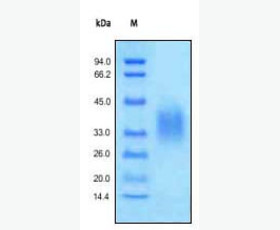Recombinant Human Cadherin-9/CDH9
| Product name: | Recombinant Human Cadherin-9/CDH9 |
| Source: | Human Cells |
| Purity: | Greater than 95% as determined by reducing SDS-PAGE. |
| Buffer Formulation: | Lyophilized from a 0.2 μm filtered solution of 20mM PB, 150mM NaCl, pH 7.2. |
| Applications: | Applications:SDS-PAGE; WB; ELISA; IP. |
| Storage: | Avoid repeated freeze/thaw cycles. Store at 2-8 oC for one month. Aliquot and store at -80 oC for 12 months. |
| UOM: | 100ug/50ug/200ug/1mg/1g |
| Source | Human Cells |
| Description | Recombinant Human Cadherin-9 is produced by our Mammalian expression system and the target gene encoding Ile22-Ala615 is expressed with a 6His tag at the C-terminus. |
| Names | Cadherin-9; CDH9 |
| Accession # | Q9ULB4 |
| Formulation | Lyophilized from a 0.2 μm filtered solution of 20mM PB, 150mM NaCl, pH 7.2. |
| Shipping |
The product is shipped at ambient temperature. |
| Reconstitution |
Always centrifuge tubes before opening. Do not mix by vortex or pipetting. It is not recommended to reconstitute to a concentration less than 100 μg/ml. Dissolve the lyophilized protein in ddH2O. Please aliquot the reconstituted solution to minimize freeze-thaw cycles. |
| Storage |
Lyophilized protein should be stored at < -20°C, though stable at room temperature for 3 weeks. Reconstituted protein solution can be stored at 4-7°C for 2-7 days. Aliquots of reconstituted samples are stable at < -20°C for 3 months. |
| Purity |
Greater than 95% as determined by reducing SDS-PAGE. |
| Endotoxin | Less than 0.1 ng/µg (1 IEU/µg) as determined by LAL test. |
| Amino Acid Sequence |
ILLQEKPNSYLSSKKIVGLTKDDGKMLRRTKRGWMWNQFFLLEEYTGTDTQYVGKLHTDQDKGDG NLKYILTGDGAGSLFVIDENTGDIHAAKKLDREEKSLYILRAKAIDRKTGRQVEPESEFIIKIHD INDNEPKFTKDLYTASVPEMSGVGTSVIQVTATDADDANYGNSAKVVYSILQGQPYFSVDPESGI IKTALPDMSRENREQYQVVIQAKDMGGQMGGLSGTTTVNITLTDVNNNPPRFPQSTYQFNSPESV PLGTHLGRIKANDPDVGENAEMEYSIAEGDGADMFDVITDKDTQEGIITVKQNLDFENQMLYTLR VDASNTHPDPRFLHLGPFKDTAVVKISVEDIDEPPVFTKVSYLIEVDEDVKEGSIIGQVTAYDPD ARNNLIKYSVDRHTDMDRIFGIHSENGSIFTLKALDRESSPWHNITVTATEINNPKQSSHIPVFI RILDINDHAPEFAMYYETFVCENAKPGQLIQTVSVMDKDDPPRGHKFFFEPVPEFTLNPNFTIVD NKDNTAGIMTRKDGYSRNKMSTYLLPILIFDNDYPIQSSTGTLTIRVCACDNQGNMQSCTAEALI LSAGLSTGAVDHHHHHH
|
| Background | Cadherins, named for calcium-dependent adhesion, are a class of type-1 transmembrane proteins that are calcium dependent cell adhesion proteins. The Cadherin superfamily includes cadherins, protocadherins, desmogleins, and desmocollins, and more. In structure, Cadherins share cadherin repeats, which are the extracellular Ca2+-binding domains. Cadherin-9, so far only described in the neural system, was identified as a reliable surface marker for renal fibroblasts. Cadherin-9 represents a novel and reliable cell surface marker for fibroblasts in healthy and diseased kidneys. Together with the established marker molecules FSP1, CD45 and α smooth muscle actin, Cadherin-9 can now be used to differentiate the heterogenic pool of renal fibroblasts into resident and activated fibroblasts, immigrated bone marrow derived fibroblast precursors and cells in different stages of epithelial mesenchymal transition. |














